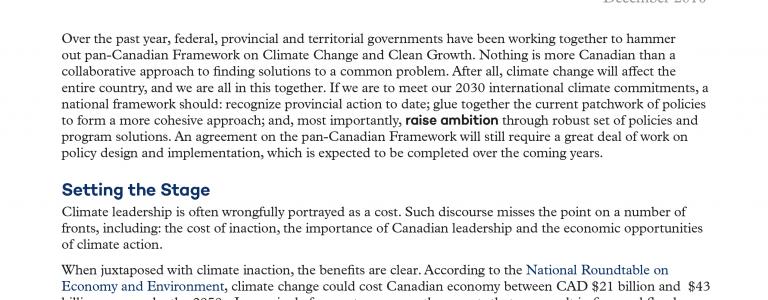Considerations in a Comprehensive Approach to Canadian Climate Policy
This commentary outlines the key elements of an effective policy in the implementation of the pan-Canadian Framework.
Over the past year, federal, provincial and territorial governments have been working together to hammer out the pan-Canadian Framework on Climate Change and Clean Growth.
Nothing is more Canadian than a collaborative approach to finding solutions to a common problem. After all, climate change will affect the entire country, and we are all in this together. If we are to meet our 2030 international climate commitments, a national framework should: recognize provincial action to date; glue together the current patchwork of policies to form a more cohesive approach; and, most importantly, raise ambition through robust set of policies and program solutions. An agreement on the pan-Canadian Framework will still require a great deal of work on policy design and implementation, which is expected to be completed over the coming years.
You might also be interested in
IISD Welcomes Draft Regulations for Oil and Gas Pollution Cap
A firm cap on emissions can provide certainty for industry to invest in decarbonization, while ensuring the sector is on a path to net-zero by 2050.
For Nature-Based Solutions to Be Effective, We Need to Work with Indigenous Peoples and Local Communities
Nature-based solutions have been praised as a promising approach to tackling the twin crises of climate change and biodiversity loss. But some Indigenous Peoples and local communities are questioning the legitimacy of the concept and what it symbolizes. It is time to listen to what they have to say.
How Fossil Fuels Drive Inflation and Make Life Less Affordable for Canadians
New report takes closer look at how Canada’s dependence on fossil fuels impacts energy costs and prices of essentials such as transportation, home heating, and housing.
How Can We Work With Nature to Tackle Drought and Desertification?
Drought is one of the most devastating and pervasive challenges exacerbated by climate change. However, we can work to reduce its effects through nature-based solutions for land restoration and climate-smart agriculture.
